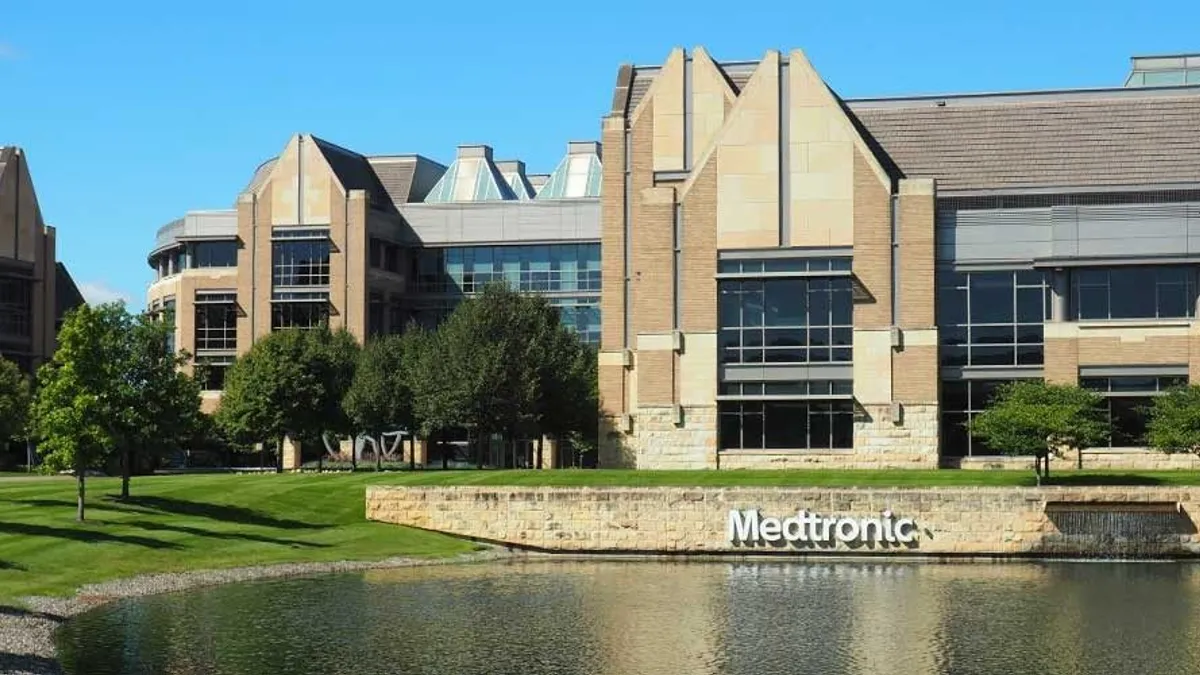Dive Brief:
- Medtronic took in nearly $8 billion in revenue, up 23% from the coronavirus-plagued quarter a year earlier, in the first fiscal year 2022 quarter ending July 30. Results sustained a trend of medtechs returning to or beating metrics seen before the coronavirus pandemic.
- CEO Geoff Martha told investors on a call Tuesday a rebound in elective care fueled the company's solid beginning to its fiscal year. Other medtechs have also reported matching or beating pre-pandemic levels as procedures returned from shutdowns in 2020 and early 2021.
- However, delta variant surges began cutting into procedure volumes in the final weeks of July. CFO Karen Parkhill said the delta variant's impact was primarily seen in the U.S., U.K., Japan and countries like Australia, New Zealand and Vietnam, which currently have lockdowns in place. However, both Martha and Parkhill expressed confidence the variant's impact on the company would be minimal. "We do expect this effect to be short-lived," Parkhill told investors.
Dive Insight:
The medtech industry has largely reported a return to or growth above pre-pandemic levels in 2021 as hospitals have increased procedures volumes and patients have been more willing to book surgeries. Similar to Medtronic, companies reliant on procedures like Johnson & Johnson, Intuitive Surgical, Edwards Lifesciences and Boston Scientific all reported that elective volumes coming back in their most recent quarters after seeing early signs of a recovery in February, March and April.
Medtronic reported sales of about $500 million above the pre-pandemic first quarter of fiscal year 2020.
While the medical device giant closed its most recent quarter with minimal impact from delta-caused surges, businesses are expected to be strained going forward.
"The slowdown that we started to see the last couple of weeks in July has continued into August," Parkhill said. "We do expect the delta variant to impact us, particularly in the United States, this quarter."
Medtronic executives contend the impact from delta is not likely to hit the company too hard. Martha noted the surges in the U.S. are primarily occurring in low-vaccinated regions, which has limited elective shutdowns that have occurred, and hospitals are also better managing the COVID-19 surges than last year.
Procedures considered more elective, such as spine or cardiac diagnostics, are seeing more deferrals, as well as procedures that typically require an intensive care unit stay, such as transcatheter aortic valve replacement procedures, according to Parkhill.
"It's much better than it was a year ago," Martha said.
Investors seemed to buy into the CEO's optimism as Medtronic shares were up over 4% Tuesday morning.
Aside from the two-week impact from delta, Martha said elective volumes were increasing month-by-month through the quarter and the company was working through COVID-19 backlogs "fairly quickly."
Medtronic's medical-surgical segment was one of the businesses boosted by the electives rebound, bringing in about $2.3 billion of sales in the quarter and beating J.P. Morgan's projections by about $114 million. The company also beat projections in neuroscience and cardiovascular sales.
The medtech's diabetes business lost ground, however. While continuous glucose monitor makers like Dexcom and Abbott Laboratories are growing sales and users nearly every quarter, Medtronic had a mid-teens decline in U.S. sales of consumables and CGMs, according to the earnings release.
"As expected, we continue to lose share in the U.S. as we wait for new product approvals," Martha said. Medtronic's newest insulin pump, the MiniMed 780G system, is under review at the FDA, and the company plans to submit its application for its next CGM sensor in the company's third quarter.
Diabetes sales of $572 million in the quarter missed expectations by $13 million, with a miss of $47 million in the U.S., according to J.P. Morgan.
Wall Street analysts too largely took the optimistic tone of execs, with Stifel calling potentially "overly conservative" that Medtronic did not build any procedure rescheduling into their future guidance.
J.P. Morgan analysts were more cautious, writing that delta made “a discernible impact on the company’s business lines” but new product launches and a possible decline in COVID-19 patient volumes in the coming weeks set up Tuesday’s updates as “a clear positive for Medtronic.”
SVB Leerink acknowledged short-term potential but were some of the few hesitant to back the company long term, for now.
“With what is clearly a more aggressive and more dynamic tone from management, with a shift in focus to being more offensive and driving market share gains, we do acknowledge what are now consistent and positive quarterly results but continue to remain on the sidelines pending further clarity around execution of new CEO Geoff Martha’s strategic plan,” the analysts wrote.
Martha laid out a reorganization plan in October 2020 after taking over from longtime CEO Omar Ishrak. The changes divided the company into units like medical surgical, diabetes and cardiovascular, giving the units full profit and loss responsibility, control of product development and the power to set R&D priorities, among other responsibilities.
“We believe he can ultimately be successful in driving a broader culture change at MDT, we do still see MDT’s long-term growth acceleration as highly levered to just a few key pipeline projects,” the analyst wrote, pointing to specific product areas like the company’s surgical robotics system Hugo.
This story has been updated with Wall Street analyst commentary.












